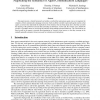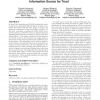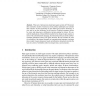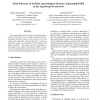119
click to vote
CI
2002
15 years 1 months ago
2002
This paper presents a formal framework and outlines a method that autonomous agents can use to negotiate the semantics of their communication language at run-time. Such an ability...
173
click to vote
ATAL
2010
Springer
15 years 3 months ago
2010
Springer
In Open Multi-Agent Systems (OMAS), deciding with whom to interact is a particularly difficult task for an agent, as repeated interactions with the same agents are scarce, and rep...
144
click to vote
ICMAS
2000
2000
An Experimental Evaluation of Domain-Independent Fault Handling Services in Open Multi-Agent Systems
15 years 3 months ago
A critical challenge to creating effective open multi-agent systems is allowing them to operate effectively in the face of potential failures. In this paper we present an experimen...
149
click to vote
CLIMA
2004
15 years 3 months ago
2004
Abstract. We introduce a logical framework suitable to formalize structures of epistemic agents. Such a framework is based on the notion of weighted directed acyclic graphs (WDAGs)...
167
click to vote
ATAL
2008
Springer
15 years 4 months ago
2008
Springer
In open multi-agent systems (MASs) we cannot assume agents to be developed in a centralized fashion. Recent proposals of commitmentbased communication frameworks aim at increasing ...
123
click to vote
ATAL
2003
Springer
15 years 5 months ago
2003
Springer
What sort of democracies should open agent societies be? We present three normative models of democracy from political philosophy and consider their relevance for the engineering o...
134
click to vote
E4MAS
2006
Springer
15 years 5 months ago
2006
Springer
Environment is an essential part of any multi-agent system (MAS), since it provides the surrounding conditions for agents to exist. For some sort of systems, the environment can be...
126
click to vote
CCGRID
2003
IEEE
15 years 7 months ago
2003
IEEE
Open multi-agent systems need to cope with the characteristics of the Internet, e.g., dynamic availability of computational resources, latency, and diversity of services. Large-sc...
112
click to vote
ATAL
2004
Springer
15 years 7 months ago
2004
Springer
The design and development of open multi-agent systems (MAS) is a key aspect in agent research. We advocate that they can be realised as electronic institutions. In this paper we ...
CEEMAS
2005
Springer
15 years 7 months ago
2005
Springer
Adversariality of the agents with respect to the multi-agent system can be a serious issue in the design of open multi-agent systems. Until now, many incoherent definitions of suc...




